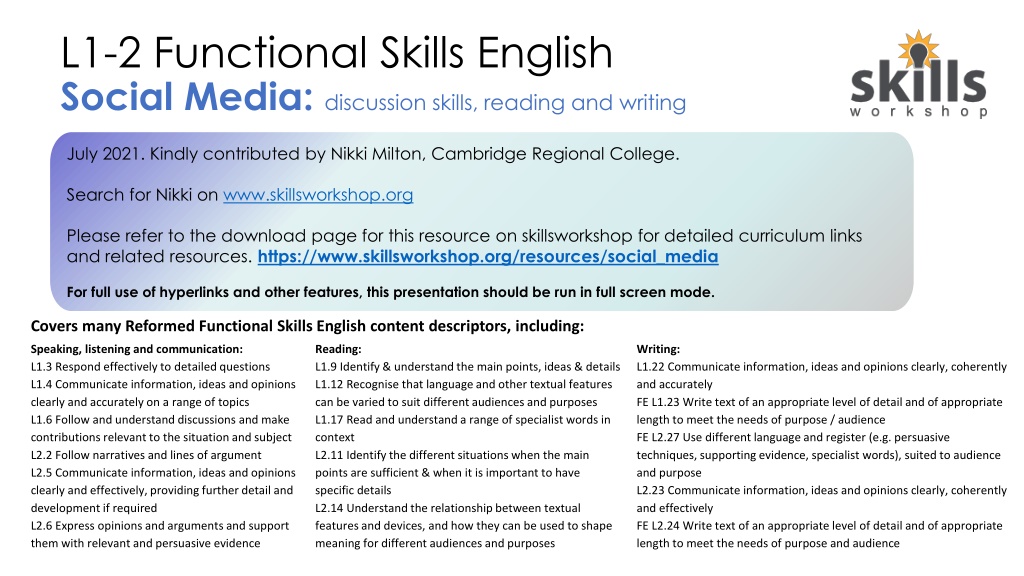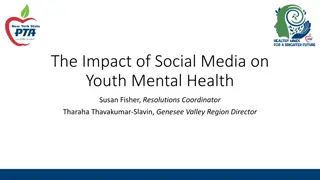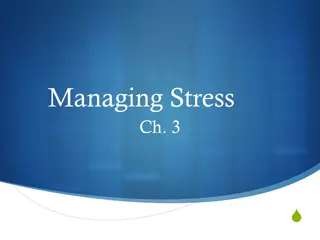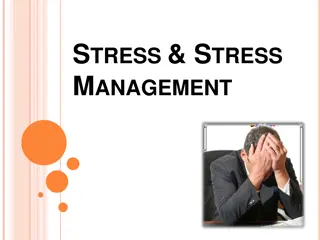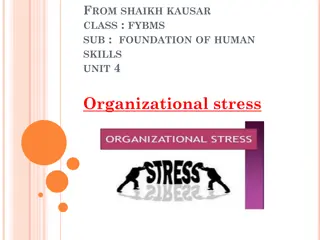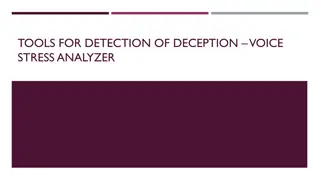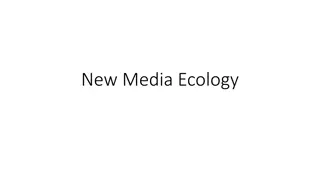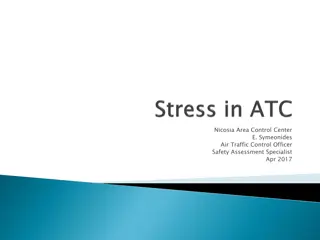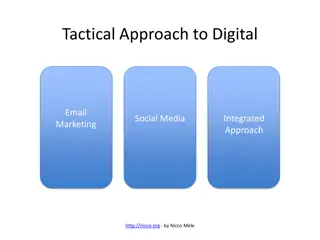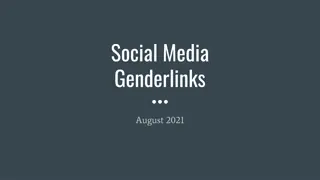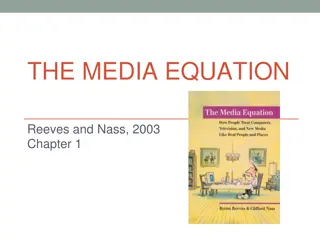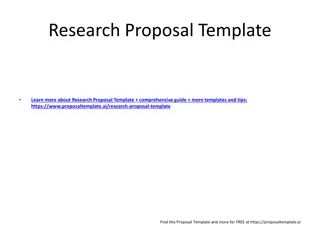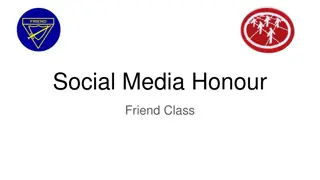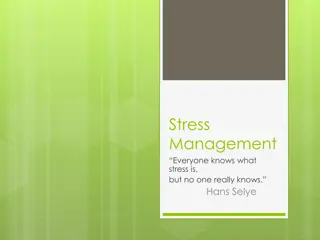Impact of Social Media on Stress Levels
Social media affects stress levels based on a study by Sophia Smith Galer, a social media producer. Discover insights on mental well-being and phone usage habits in relation to stress. Join the discussion on managing stress levels in the digital age.
Download Presentation

Please find below an Image/Link to download the presentation.
The content on the website is provided AS IS for your information and personal use only. It may not be sold, licensed, or shared on other websites without obtaining consent from the author.If you encounter any issues during the download, it is possible that the publisher has removed the file from their server.
You are allowed to download the files provided on this website for personal or commercial use, subject to the condition that they are used lawfully. All files are the property of their respective owners.
The content on the website is provided AS IS for your information and personal use only. It may not be sold, licensed, or shared on other websites without obtaining consent from the author.
E N D
Presentation Transcript
L1-2 Functional Skills English Social Media: discussion skills, reading and writing July 2021. Kindly contributed by Nikki Milton, Cambridge Regional College. Search for Nikki on www.skillsworkshop.org Please refer to the download page for this resource on skillsworkshop for detailed curriculum links and related resources. https://www.skillsworkshop.org/resources/social_media For full use of hyperlinks and other features, this presentation should be run in full screen mode. Covers many Reformed Functional Skills English content descriptors, including: Speaking, listening and communication: L1.3 Respond effectively to detailed questions L1.4 Communicate information, ideas and opinions clearly and accurately on a range of topics L1.6 Follow and understand discussions and make contributions relevant to the situation and subject L2.2 Follow narratives and lines of argument L2.5 Communicate information, ideas and opinions clearly and effectively, providing further detail and development if required L2.6 Express opinions and arguments and support them with relevant and persuasive evidence Reading: L1.9 Identify & understand the main points, ideas & details L1.12 Recognise that language and other textual features can be varied to suit different audiences and purposes L1.17 Read and understand a range of specialist words in context L2.11 Identify the different situations when the main points are sufficient & when it is important to have specific details L2.14 Understand the relationship between textual features and devices, and how they can be used to shape meaning for different audiences and purposes Writing: L1.22 Communicate information, ideas and opinions clearly, coherently and accurately FE L1.23 Write text of an appropriate level of detail and of appropriate length to meet the needs of purpose / audience FE L2.27 Use different language and register (e.g. persuasive techniques, supporting evidence, specialist words), suited to audience and purpose L2.23 Communicate information, ideas and opinions clearly, coherently and effectively FE L2.24 Write text of an appropriate level of detail and of appropriate length to meet the needs of purpose and audience
Social Media How does social media affect stress? How does social media affect stress? Key Vocabulary BBC Future s social media producer Sophia Smith Galer monitored her stress levels and social media usage for a week here s what she found out. social networking sites multimedia I wouldn t describe myself as a particularly stressed-out person. I enjoy my job, have a fairly 9-5 working life and spend the rest of my waking hours doing my best to go out and have fun. I m a social media producer, meaning that I run accounts on social networking sites and produce multimediacontent for them. I m online all the time, yes, but I ve never seen that as unusual or stressful; it goes hand-in-hand with being a digital journalist and it seems like a natural progression for somebody who spent much of her adolescence online. digital journalist adolescence Mental well-being That s how I used to describe myself until I spent a week testing my stress levels and found out that they re actually quite high. I ve spent the last month leading #LikeMinded, BBC Future s month-long season on social media and its impact on our mental well-being, and it s made me question my relationship with my smartphone. Turning it on in the morning and staying wired is as integral to my life as clothes and food. Is that habit somehow linked to why I seem to be so stressed? #LikeMinded Discussion Point Discussion Point How would you describe your relationship with your phone? In the pursuit of knowledge, I allowed myself to be a human guinea pig for one week, revealing my stress levels and social media usage to my team and, now, to you. I also managed to persuade other social media producers to get involved to get a broader idea of our relationships with our phones, both within and outside our working life. Importantly, it showed me how I compare to other people and that s probably what shocked me the most. What advice would you give to a friend who is struggling with high stress levels? Text Source: https://www.bbc.com/future/article/20180201-what-i-learned-by-testing-my-stress-levels-on-social-media
#LikeMinded Social Media I used three different monitors to probe my mental well-being and social media use over the week; a Pip, Momentand Checky. The Pip is a little device that measures your stress levels via your fingertips, something that s known as your electradermal activity. Moment is an app that measures how much time you spend on your phone, and Checky keeps an eye on how many times you check your phone every day. Here are the results from my Pip, alongside those of three other producers: Dhruti Shah from BBC News, Eleanor Dunn from BBC Entertainment News and Elie Gordon who manages social media for BBC Earth. Discussion Point Discussion Point What does the line graph tell us about stress Eleanor s stress levels during the week? Who has the highest stress levels throughout the week? Which day do the stress levels appear to be the lowest? What is the average level of stress on Wednesday? I learnt three main lessons: Key Vocabulary electradermal activity 1. There is no weekend effect Pip 2. I check my phone a LOT Moment Checky 3. I go on my phone for escapism Line graph Average (mean) Text Source: https://www.bbc.com/future/article/20180201-what-i-learned-by-testing-my-stress-levels-on-social-media
#LikeMinded Social Media The hidden messages in social media The hidden messages in social media Key Vocabulary There it is in your Facebook timeline or Instagram gallery a digital footprint of your mental health. digital footprint It s not hidden in the obvious parts: the emojis, hashtags and inspirational quotes. Instead, it lurks in subtler signs that, unbeknownst to you, may provide a diagnosisas accurate as a doctor s blood pressure cuff or heart rate monitor. mental health unbeknownst For those who see social media mainly as a place to share the latest cat video or travel snap, this may come as a surprise. It also means the platform has important and potentially life-saving potential. In the US alone, there is one death by suicide every 13 minutes. Despite this, our ability to predict suicidal thoughts and behaviour has not materially improved across 50 years of research. Forecasting an episode of psychosis or emerging depressioncan be equally challenging. diagnosis psychosis emerging granular data Identify two ways that social media can be used to predict your mental well- being. But data mining and machine learning are transforming this landscape by extracting signals from dizzying amounts of granular data on social media. These methods already have tracked and predicted flu outbreaks. Now, it s the turn of mental health. unbeknownst to you Give one word or phrase to replace unbeknownst that keeps the meaning of this quotation from the same. Clues to the state of your mental health may be hiding in plain sight in the tweets you send and the Facebook updates you post Studies have found that if you have depression, your Instagram feed is more likely to feature bluer, greyer, and darker photos with fewer faces. They ll probably receive fewer likes (but more comments). Chances are you ll prefer the Inkwell filter which converts colour images to black and white, rather than the Valencia one which lightens them. Identify two language features used to discuss how social media destroys your mind. Give examples to support each answer. Text Source: https://www.bbc.com/future/article/20180201-how-your-social-media-betrays-your-mood
#LikeMinded Social Media Researchers from Harvard University and the University of Vermont used these techniques in their recent analysis of almost 44,000 Instagram posts. Their resulting models correctly identified 70% of all users with depression. compared to a rate of 42% from general practitioners. They also had fewer false positives (although this figure drew from a separate population, so may be an unfair comparison). Depressive signals were evident in users feeds even before a formal diagnosis from psychiatrists making Instagram an early warning system of sorts. Telling signals of depression include an increase in negative words ( no , never , prison , murder ) and a decrease in positive ones ( happy , beach , and photo ), but these are hardly definitive. Taking it a step further, researchers at Harvard University, Stanford University and the University of Vermont extracted a wider range of features (mood, language and context) from almost 280,000 tweets. The resulting computational model scored highly on identifying users with depression; it also was correct in about nine of every 10 PTSD predictions. Key Vocabulary resulting models general practitioners diagnosis Meanwhile, psychiatrists have long linked language and mental health, listening for the disjointed and tangential speech of schizophrenia or the increased use of first-person singular pronouns of depression. psychiatrists disjointed From my 1017 most recent words on Twitter, I m apparently average for being angry and worried but below average on being upbeat I have been pretty pessimistic about the state of the world recently. tangential schizophrenia pessimistic Discussion Point Discussion Point computational What would your social media posts suggest about your mental well-being? Find five emotive words from your social media feed. Are their positive or negative words? Is social media a good place to visit when you re feeling vulnerable or down? Explain your answer. Text Source: https://www.bbc.com/future/article/20180201-how-your-social-media-betrays-your-mood
Social Media Are you a social media addict? Are you a social media addict? Describing yourself as a social media addict doesn t usually inspire concern from other people. In fact, it s frequently included in bio descriptions on Twitter and Instagram. Decorate your LinkedIn profile with such a claim and you may even find yourself receiving interest from media and publishing companies searching for a savvy digital native. But imagine if, one day, it s not an accolade or joke at all but a psychiatrist s diagnosis? Social media addiction has been a much-floutedterm lately; maybe it s because it s January and users are looking to be more active and spend less time online, or maybe that s because social media can have a negative impact on our mental well-being. But a growing body of research is seriously considering whether problematic and excessive social media usage could be pathological and, in turn, designated as a mental health disorder. There are two established organisations which classify mental disorders the World Health Organisation (WHO) and the American Psychiatric Association. Any alleged addiction needs to fit certain criteria before it s considered pathological behaviour, and there needs to be a vast amount of research that confirms it. It was only announced in January 2018 that video gaming addiction a problem as old as the internet itself will be listed by the WHO as a disorder. Key Vocabulary Discussion Point Discussion Point savvy digital native What is the message within the short film Percentage of Life ? What similarities are there between this text and the video? Can you give examples to support your point? accolade much-flouted How long can you go without checking your social media accounts? pathological What do you think constitutes a social media addict? #LikeMinded Text Source: https://www.bbc.com/future/article/20180118-how-much-is-too-much-time-on-social-media Video Source: https://www.youtube.com/watch?app=desktop&v=0Y6v_1dwF3c
Social Media Are you Living an Insta Life? Social Media Vs. Reality Are you Living an Insta Life? Social Media Vs. Reality #LikeMinded Writing Task Write an article about the use of social media replacing face-to-face interaction among many people in society. Discussion Point Discussion Point Are all your online posted pictures a true reflection of your life? You should: Discuss the advantages and disadvantages of social media Consider whether the advantages outweigh the disadvantages? The power of influence social media has on your contacts Give your opinions and persuade people to agree with you. What have you posted that tell a different story about your day? Why do you think people post pictures that give their audience a different impression about their lives? Why are reactions to photos and posts so important to people? You should aim to write about 250 to 300 words. Video Source: https://www.youtube.com/watch?v=0EFHbruKEmw
Social Media Writing Task Write a contribution to the web forum about how you keep in touch with people. In your contribution, you should: give your views on using social media to keep in touch with people describe how you prefer to communicate #LikeMinded You should aim to write about 200 to 250 words. Video Source: https://www.youtube.com/watch?v=0EFHbruKEmw
